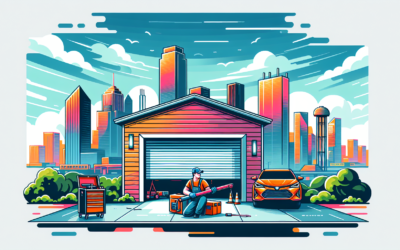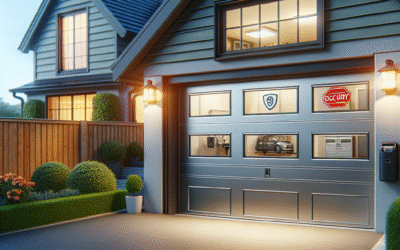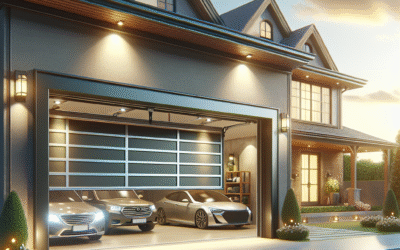Common Garage Door Issues and Expert Solutions to Fix Them Quickly
Few things disrupt your day quite like a malfunctioning garage door According to government garage door accident data,. Whether it refuses to open, makes strange noises, or gets stuck halfway, these common garage door problems can quickly turn from minor annoyances into major inconveniences. Your garage door is not just a convenient entry point; it also plays a crucial role in the security and curb appeal of your home. When issues arise, knowing how to identify the problem and what steps to take can save you time, money, and frustration.
In this article, we’ll walk you through the most frequent garage door service problems and provide practical advice on how to address them. From broken springs and faulty openers to misaligned tracks and sensor troubles, understanding the root cause is the first step toward a reliable fix. Whether you’re a DIY enthusiast or prefer calling in the professionals, these insights will equip you with the knowledge to keep your garage door operating smoothly and safely all year round.
Identify Common Garage Door Problems Early
Recognizing issues such as unusual noises, slow operation, or door misalignment can prevent minor problems from escalating into costly repairs. Early detection allows for timely intervention, ensuring your garage door functions smoothly and safely.
Perform Regular Maintenance
Routine maintenance—including lubricating moving parts, tightening hardware, and inspecting springs and cables—extends the lifespan of your garage door system. Regular upkeep reduces the risk of unexpected breakdowns and maintains optimal performance.
Know When to Call a Professional
While some minor repairs can be handled DIY, complex issues like broken springs, faulty openers, or electrical problems require expert attention. Hiring a licensed garage door technician ensures repairs are done safely and correctly.
Ensure Safety (see garage door safety guidelines) Precautions Are Followed
Garage doors are heavy and operate under tension, making them potentially dangerous if mishandled. Always disconnect power before attempting repairs and avoid tampering with high-tension components to prevent injury.
Choose Reliable Garage Door Service Providers
Selecting experienced and reputable professionals guarantees quality workmanship and reliable service. Look for companies with positive reviews, proper licensing, and transparent pricing to avoid scams and ensure customer satisfaction.
Common Garage Door Problems and How to Identify Them
Garage doors are essential for home security and convenience, but like any mechanical system, they can experience issues over time. Common problems include the door not opening or closing properly, unusual noises during operation, the door getting stuck halfway, or the remote control failing to respond. For example, if your garage door makes a grinding sound when opening, this could indicate worn-out rollers or a misaligned track. Identifying the specific problem early can save you from more costly repairs down the line. Regular inspection of springs, cables, rollers, and the opener mechanism can help pinpoint issues before they escalate.
Troubleshooting Garage Door Opener Issues
If your garage door opener isn’t working, start by checking the power source. Ensure the opener is plugged in and that the circuit breaker hasn’t tripped. Next, examine the remote control batteries and try reprogramming the remote if necessary. Sometimes, interference from nearby devices or a blocked sensor can prevent the door from operating. For instance, if the safety sensors at the bottom of the door are misaligned or dirty, the door may refuse to close. Cleaning the sensors and realigning them can often resolve this. If these steps don’t work, the problem might be with the opener’s motor or circuit board, which typically requires professional diagnosis.
How to Handle Broken Garage Door Springs Safely
Garage door springs bear a lot of tension and can be dangerous if they break. If you notice the door suddenly becomes very heavy or won’t stay open, a broken spring is likely the cause. It’s important not to attempt repairs yourself unless you have experience and proper tools, as springs can cause serious injury. Instead, contact a professional garage door technician to replace the springs safely. In the meantime, avoid using the door manually to prevent further damage or accidents. Regular maintenance checks can help identify worn springs before they snap, prolonging the lifespan of your garage door system.
Dealing with Noisy Garage Doors
Excessive noise during garage door operation is a common complaint and usually signals the need for maintenance. Squeaking, grinding, or rattling sounds often come from worn rollers, loose hardware, or lack of lubrication. To reduce noise, start by tightening all bolts and screws on the door and opener track. Then, apply a silicone-based lubricant to the rollers, hinges, and springs—avoid using grease or oil that can attract dirt. If the rollers are made of metal and causing noise, consider upgrading to nylon rollers for quieter operation. Persistent noise despite these efforts may indicate the need for component replacement, which a professional can assess.
What to Do When Your Garage Door Gets Stuck
A garage door that gets stuck midway can be frustrating and potentially dangerous. First, disconnect the opener by pulling the emergency release cord to allow manual operation. Check for any visible obstructions in the tracks, such as debris or bent sections. Clean the tracks thoroughly and straighten any dents using a rubber mallet or similar tool. Inspect the rollers for damage or wear and replace if necessary. Also, ensure that the door is properly balanced; an unbalanced door strains the opener and can cause sticking. If manual attempts fail or the door remains stuck, it’s best to call a professional to avoid injury or further damage.
Maintaining Your Garage Door for Long-Term Reliability
Regular maintenance is key to preventing most garage door problems. Schedule inspections every six months to check springs, cables, rollers, and the opener system. Clean the tracks and lubricate moving parts using recommended products. Test the door’s balance by disconnecting the opener and manually lifting the door halfway; it should stay in place without falling. If it doesn’t, the springs may need adjustment. Also, test the safety sensors monthly to ensure they reverse the door if an object is detected. Keeping the garage door clean and free from debris around the tracks can extend its lifespan and improve performance.
When to Call a Professional Garage Door Technician
While some minor garage door issues can be handled with DIY troubleshooting, many problems require professional expertise. Broken springs, damaged cables, opener motor failures, and complex electrical issues are best left to trained technicians. Attempting these repairs without proper knowledge can lead to injury or further damage. Additionally, professionals have access to specialized tools and replacement parts to ensure safe and efficient repairs. If you experience repeated malfunctions, unusual noises, or safety sensor problems, scheduling a professional inspection can prevent unexpected breakdowns and costly repairs.
Upgrading Your Garage Door for Improved Functionality and Security
If your garage door is old or frequently problematic, consider upgrading to a modern model with enhanced features. New doors offer better insulation, improved security with rolling code technology, and quieter operation. Smart garage door openers allow you to control and monitor your door remotely via smartphone apps, adding convenience and peace of mind. When selecting a new door, factor in material durability, style, and compatibility with your existing opener. Professional installation ensures proper alignment and functionality, reducing future maintenance needs.
Emergency Garage Door Repairs: What You Need to Know
Garage door emergencies can happen at any time, such as a door stuck open during bad weather or a broken spring posing safety risks. Knowing what to do in these situations is crucial. If your door won’t close, check the safety sensors and clear any obstructions. For broken springs or cables, avoid using the door and contact an emergency repair service immediately. Many garage door companies offer 24/7 emergency assistance to address urgent problems quickly. Having the contact information of a trusted local technician on hand can save time and reduce stress during unexpected breakdowns.
Preventing Garage Door Problems Through Seasonal Care
Seasonal changes can affect your garage door’s performance. In colder months, metal parts may contract and become brittle, increasing the risk of breakage. Lubricate the door components before winter to prevent freezing and stiffness. In warmer seasons, dust and debris can accumulate in the tracks and rollers, so regular cleaning is essential. Inspect weather stripping around the door to maintain insulation and prevent drafts. Adjusting maintenance routines based on the season helps ensure your garage door operates smoothly year-round and reduces the likelihood of unexpected failures.
1. What are the most common garage door problems homeowners face?
Some of the most common garage door issues include the door not opening or closing properly, noisy operation, broken springs or cables, misaligned tracks, and malfunctioning garage door openers. Regular maintenance can help prevent many of these problems.
2. How can I tell if my garage door spring is broken?
A broken garage door spring often causes the door to become very heavy and difficult to lift manually. You might also hear a loud bang when the spring snaps. If you notice the door is uneven or won’t stay open, it’s likely a spring issue that requires professional repair.
3. What should I do if my garage door opener stops working?
If your garage door opener isn’t working, first check the power source and remote batteries. Inspect the safety sensors to ensure they are aligned and clean. If these steps don’t help, the problem could be with the motor or circuit board, and you should contact a professional technician.
4. Why is my garage door making loud noises when operating?
Loud noises during operation are often caused by worn rollers, loose hardware, or lack of lubrication. Regularly lubricating moving parts and tightening bolts can reduce noise. If the noise persists, a professional inspection may be necessary to replace damaged components.
5. Can I fix a misaligned garage door track myself?
Minor track misalignments can sometimes be corrected at home by loosening the bolts and gently tapping the track back into place. However, if the track is severely bent or damaged, it’s safer to call a garage door specialist to avoid further damage or injury.
6. How often should I schedule maintenance for my garage door?
It’s recommended to have your garage door professionally inspected and maintained at least once a year. Regular maintenance helps identify potential problems early, ensures smooth operation, and extends the lifespan of your door and opener.
7. Is it safe to repair garage door springs on my own?
Repairing or replacing garage door springs is dangerous due to the high tension they are under. Attempting a DIY repair can lead to serious injury. It’s best to leave spring repairs to trained professionals who have the proper tools and experience. For more information, see garage door maintenance research.
8. What causes a garage door to close and then reverse immediately?
This issue is often related to the safety sensors at the bottom of the door. If the sensors are misaligned, dirty, or obstructed, the door will reverse as a safety precaution. Cleaning and realigning the sensors usually resolves the problem.
9. How can I improve the security of my garage door?
To enhance garage door security, consider installing a modern opener with rolling code technology, adding motion sensor lights, reinforcing the door with stronger materials, and ensuring the door locks properly. Regularly updating the opener’s access codes also helps prevent unauthorized entry.
10. When should I consider replacing my garage door instead of repairing it?
If your garage door has frequent issues, is outdated, damaged beyond repair, or inefficient in insulation, it might be more cost-effective to replace it. A new door can improve curb appeal, increase home security, and provide better energy efficiency.
Conclusion: Keeping Your Garage Door in Top Shape
Dealing with garage door problems can be frustrating, but understanding the common issues and their solutions empowers you to act quickly and effectively. Whether it’s a malfunctioning opener, broken springs, or misaligned tracks, timely maintenance and prompt repairs are essential to ensure safety and convenience. Regular inspections and addressing minor problems early can prevent costly damages and extend the lifespan of your garage door system.
Don’t wait until a small issue turns into a major headache—reach out to professional garage door services to get expert assistance and reliable repairs. Investing in quality maintenance not only protects your property but also provides peace of mind. Contact your local garage door specialists today to schedule an inspection or repair and keep your garage door operating smoothly year-round.





0 Comments